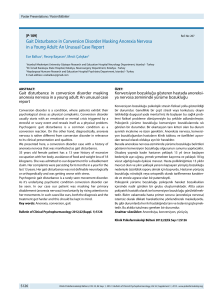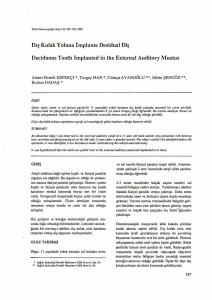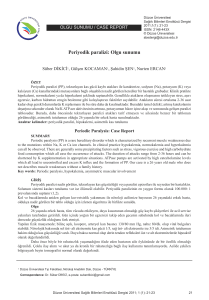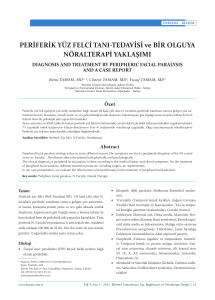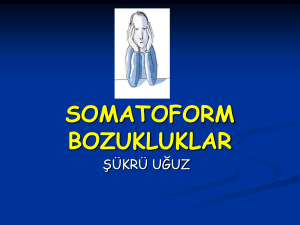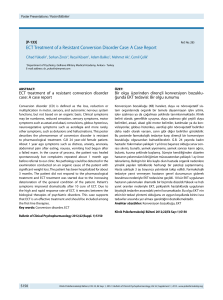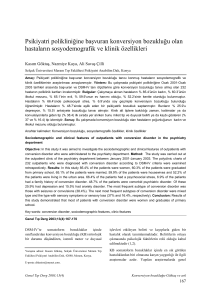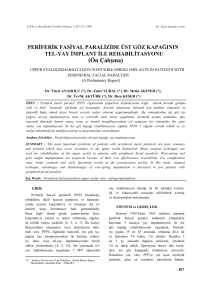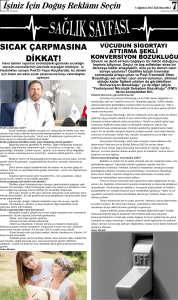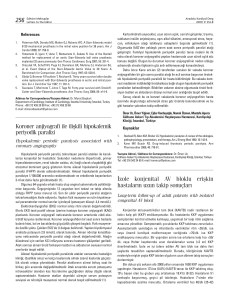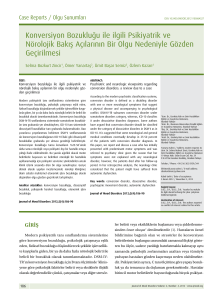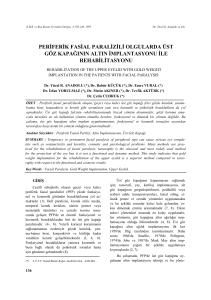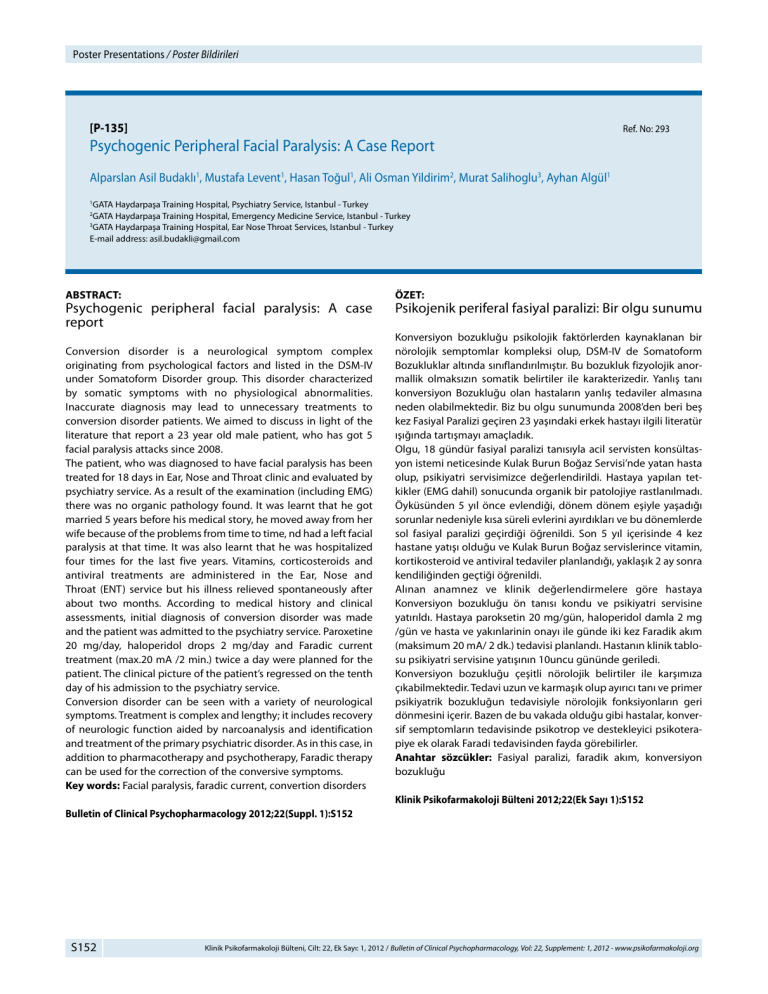
Poster Presentations / Poster Bildirileri
[P-135]
Ref. No: 293
Psychogenic Peripheral Facial Paralysis: A Case Report
Alparslan Asil Budaklı1, Mustafa Levent1, Hasan Toğul1, Ali Osman Yildirim2, Murat Salihoglu3, Ayhan Algül1
GATA Haydarpaşa Training Hospital, Psychiatry Service, Istanbul - Turkey
GATA Haydarpaşa Training Hospital, Emergency Medicine Service, Istanbul - Turkey
3
GATA Haydarpaşa Training Hospital, Ear Nose Throat Services, Istanbul - Turkey
E-mail address: [email protected]
1
2
ABS­TRACT:
Psychogenic peripheral facial paralysis: A case
report
Conversion disorder is a neurological symptom complex
originating from psychological factors and listed in the DSM-IV
under Somatoform Disorder group. This disorder characterized
by somatic symptoms with no physiological abnormalities.
Inaccurate diagnosis may lead to unnecessary treatments to
conversion disorder patients. We aimed to discuss in light of the
literature that report a 23 year old male patient, who has got 5
facial paralysis attacks since 2008.
The patient, who was diagnosed to have facial paralysis has been
treated for 18 days in Ear, Nose and Throat clinic and evaluated by
psychiatry service. As a result of the examination (including EMG)
there was no organic pathology found. It was learnt that he got
married 5 years before his medical story, he moved away from her
wife because of the problems from time to time, nd had a left facial
paralysis at that time. It was also learnt that he was hospitalized
four times for the last five years. Vitamins, corticosteroids and
antiviral treatments are administered in the Ear, Nose and
Throat (ENT) service but his illness relieved spontaneously after
about two months. According to medical history and clinical
assessments, initial diagnosis of conversion disorder was made
and the patient was admitted to the psychiatry service. Paroxetine
20 mg/day, haloperidol drops 2 mg/day and Faradic current
treatment (max.20 mA /2 min.) twice a day were planned for the
patient. The clinical picture of the patient’s regressed on the tenth
day of his admission to the psychiatry service.
Conversion disorder can be seen with a variety of neurological
symptoms. Treatment is complex and lengthy; it includes recovery
of neurologic function aided by narcoanalysis and identification
and treatment of the primary psychiatric disorder. As in this case, in
addition to pharmacotherapy and psychotherapy, Faradic therapy
can be used for the correction of the conversive symptoms.
Key words: Facial paralysis, faradic current, convertion disorders
ÖZET:
Psikojenik periferal fasiyal paralizi: Bir olgu sunumu
Konversiyon bozukluğu psikolojik faktörlerden kaynaklanan bir
nörolojik semptomlar kompleksi olup, DSM-IV de Somatoform
Bozukluklar altında sınıflandırılmıştır. Bu bozukluk fizyolojik anormallik olmaksızın somatik belirtiler ile karakterizedir. Yanlış tanı
konversiyon Bozukluğu olan hastaların yanlış tedaviler almasına
neden olabilmektedir. Biz bu olgu sunumunda 2008’den beri beş
kez Fasiyal Paralizi geçiren 23 yaşındaki erkek hastayı ilgili literatür
ışığında tartışmayı amaçladık.
Olgu, 18 gündür fasiyal paralizi tanısıyla acil servisten konsültasyon istemi neticesinde Kulak Burun Boğaz Servisi’nde yatan hasta
olup, psikiyatri servisimizce değerlendirildi. Hastaya yapılan tetkikler (EMG dahil) sonucunda organik bir patolojiye rastlanılmadı.
Öyküsünden 5 yıl önce evlendiği, dönem dönem eşiyle yaşadığı
sorunlar nedeniyle kısa süreli evlerini ayırdıkları ve bu dönemlerde
sol fasiyal paralizi geçirdiği öğrenildi. Son 5 yıl içerisinde 4 kez
hastane yatışı olduğu ve Kulak Burun Boğaz servislerince vitamin,
kortikosteroid ve antiviral tedaviler planlandığı, yaklaşık 2 ay sonra
kendiliğinden geçtiği öğrenildi.
Alınan anamnez ve klinik değerlendirmelere göre hastaya
Konversiyon bozukluğu ön tanısı kondu ve psikiyatri servisine
yatırıldı. Hastaya paroksetin 20 mg/gün, haloperidol damla 2 mg
/gün ve hasta ve yakınlarinin onayı ile günde iki kez Faradik akım
(maksimum 20 mA/ 2 dk.) tedavisi planlandı. Hastanın klinik tablosu psikiyatri servisine yatışının 10uncu gününde geriledi.
Konversiyon bozukluğu çeşitli nörolojik belirtiler ile karşımıza
çıkabilmektedir. Tedavi uzun ve karmaşık olup ayırıcı tanı ve primer
psikiyatrik bozukluğun tedavisiyle nörolojik fonksiyonların geri
dönmesini içerir. Bazen de bu vakada olduğu gibi hastalar, konversif semptomların tedavisinde psikotrop ve destekleyici psikoterapiye ek olarak Faradi tedavisinden fayda görebilirler.
Anahtar sözcükler: Fasiyal paralizi, faradik akım, konversiyon
bozukluğu
Kli­nik Psikofarmakoloji Bülteni 2012;22(Ek Sayı 1):S152
Bulletin of Clinical Psychopharmacology 2012;22(Suppl. 1):S152
S152
Klinik Psikofarmakoloji Bülteni, Cilt: 22, Ek Sayı: 1, 2012 / Bulletin of Clinical Psychopharmacology, Vol: 22, Supplement: 1, 2012 - www.psikofarmakoloji.org

